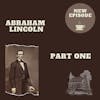Abraham Lincoln: Part One

The sixteenth president of the United States, Abraham Lincoln is consistently ranked as one of the best presidents by historians.
A man who oversaw the fracturing of the nation, Abraham Lincoln lived quite a life before ever stepping foot inside the White House. So much so that his life must be told over a number of episodes.
Join me this week as I dive into Lincoln's early history. How did he get into law? Who was his first fiancé? Turn in to learn this and more.
SOURCES
Burlingame, Michael. “Abraham Lincoln.” UVA Miller Center. (LINK)
Lewis, James E. “The Black Hawk War: Background.” Northern Illinois University Digital Library. (LINK)
Meacham, Jon. And There Was Light: Abraham Lincoln and the American Struggle. United States: Penguin Random House Audio Publishing Group, 2022.
Townsend, William H. “COMMONWEALTH OF KENTUCKY VS. ABRAHAM LINCOLN.” American Bar Association Journal 14, no. 2 (1928): 80–82. http://www.jstor.org/stable/25707351.
“Sarah Lincoln Grigsby.” National Park Service. Updated June 2022. (LINK)
White, Ronald C.., White, Ronald C.. A. Lincoln: A Biography. United Kingdom: Random House Publishing Group, 2009.
Welcome to Civics and Coffee. My name is Alycia and I am a self-professed history nerd. Each week, I am going to chat about a topic on U.S history and give you both the highlights and occasionally break down some of the complexities in history; and share stories you may not remember learning in high school. All in the time it takes to enjoy a cup of coffee.
INTRO MUSIC
Hey everyone. Welcome back.
Consistently listed as one of the most revered presidents in rankings by historians, Abraham Lincoln oversaw one of the darkest periods in United States history. Coming to office in 1861, Lincoln could do little more than watch as states across the union SUSEEDED from the Union.
Scholars have dedicated thousands of pages to the 16th president and, of course, no overview or discussion of the Civil War would be complete without a deep dive into the life and motivations of the Commander in Chief. However, I remain committed to my bite size format and therefore decided to do things a bit differently in covering Lincoln. I decided that I would break up the story of Lincoln’s life into TWO (THREE?) parts. And instead of releasing them back to back like I’ve done with individuals like Frederick Douglass, I am going to spread out my narrative a bit - and Lincoln’s life will serve as a bit of a bookend in my coverage of the Civil War.
So, this week, I am starting the life of Abraham Lincoln. What was his youth like? How did he get involved in politics? And how did he meet future First Lady Mary Elizabeth Todd?
Grab your cup of coffee, peeps. Let’s do this.
Abraham Lincoln entered the world on February 12, 1809 in what was then called Hardin County, Kentucky - considered the frontier of the still nascent nation. Born in a small log cabin, Lincoln was not a man born into privilege. His father, Thomas, was illiterate and could barely sign his own name. Described as 5 foot 10 with black hair and blue eyes set upon high cheekbones, the patriarch of the family was known for being quite stern. He served in local militias and was a member of the local Baptist church. Despite his lack of education, Thomas amassed quite a bit of property over his lifetime. Lincoln’s mother, Nancy, was born to a single mother and spent her youth living with an Aunt and Uncle, becoming a seamstress. The Lincoln’s married on June 12th, 1806 and would have three children. Eldest sibling Sarah, born in 1807, followed by Abraham in 1809 and a little boy named Thomas who died shortly after his birth in 1812.
Life along the frontier was rough and young Abraham spent his youth helping with household chores. He received very little education, journeying to the local one room schoolhouse for a few months at a time. When Lincoln was 7, the family packed up and headed toward the Indiana territory. Situated in the middle of the western frontier, the land was wild and required quite a bit of clearing to make room for a house. Young Lincoln got to work, helping his father clear the brush. He then worked with his father to build a new log cabin, an activity that would show up in future campaign materials, where Lincoln was complimented as being large for his age and a master of the ax.
Tragedy struck the Lincoln household when Abraham’s mother Nancy contracted an illness from drinking bad milk and died in 1818. She was just 34 and Lincoln only 9. Later in his career, Lincoln would praise his mother as having an outsized influence on his life, however it remains unclear whether he was referencing his birth mother or the woman who took on the role of stepmother just a year later when Thomas and Sarah Bush wed on December 2, 1819. The young Lincoln bonded quickly with his stepmother, who was very supportive of his education. He continued to seek out knowledge, attending another school house while living in Indiana. Lincoln was growing, both physically and mentally. As described by historian and Lincoln biographer Ronald C. White Junior, quote: “although thoroughly taking part in the young masculine world of wrestling, running, and jumping, he was also carving out an interior world of intellectual curiosity, reading and memorization, and imagination,” end quote.
Lincoln continued to work on the family farm, hiring himself out to split rails and harvest corn. As was custom, his earnings went back to the patriarch of the family and at 17, started ferrying goods along the Ohio River for James Taylor. For his services, Lincoln received $6 per month, earning quite a bit more than he had performing manual labor for others. However, Lincoln’s time as a ferryboat operator did not last long as landed himself in legal trouble over contested ferry rights. Before long, Lincoln found himself in front of a judge in the case of The Commonwealth of Kentucky v Abraham Lincoln. Luckily for Lincoln, he won the case on a technicality, but the experience left him impressed with the law.
Tragedy struck the Lincoln family once more when Abraham’s older sister Sarah, with whom he was incredibly close, died due to complications from childbirth in January 1828. At just 18 years old, Abraham Lincoln had lost a mother, brother, and now a sister. Still suffering the loss of his sister, Lincoln was offered another ferry boat job - this time to assist with shipping goods down to New Orleans. This trip exposed Lincoln to a wide variety of different personalities and the young man earned quite a decent sum for his efforts, pocketing $8 for the month of work.
The Lincoln family moved once more when Abraham was 21 - from Indiana to Illinois. However, now a young man, Abraham wanted to strike out on his own and so he built a ferryboat and worked as an independent operator before setting up to live on his own in New Salem in 1831. New to town, Abraham found employment as a clerk at the local general store. This proved a wonderful opportunity for Lincoln as he got to know his fellow neighbors as they came in to shop for goods and benefitted from his ability to read and write. It was shortly after arriving in New Salem that Lincoln was bit with the political bug and decided to run for the Illinois legislature in 1832.
Announcing his candidacy in the Sangamo Journal on March 15th, Lincoln wrote, in part, quote: “I have no wealthy or popular relations to recommend. My case is thrown exclusively upon the independent votes of this county, and if elected they will have conferred a favor upon me, for which I shall by unremitting in my labors to compensate,” end quote. Included in his message was his acknowledgment of his youthfulness and his desire to push for internal improvements. But before Lincoln could devote himself to campaigning, war broke out, causing the young candidate to enlist in the military.
The conflict known as the Black Hawk War, originated over land disputes between the Fox and Sauk (Sock) nations and the United States government. At issue was a treaty signed in 1804 where in exchange for $1,000 per year in goods, members of the Fox and Sauk tribes released claims on their land in the Illinois territory. While the federal government considered the treaty binding and legal, members of the tribes did not, pointing to the fact that the men who signed the original agreement had no authority to do so. Led by Sauk leader Black Hawk, warriors entered the Illinois territory, likely trying to reclaim their lost land.
Hearing news of the attack, Lincoln signed up and was sworn into duty on April 21st, 1832. In a move that touched Lincoln deeply, the unit of men chose him as Captain. But, despite his three tours of duty, Lincoln participated in no military action and returned to New Salem just two weeks prior to the election. While he tried to campaign, time was not on his side and Lincoln finished 8th in a candidate pool of 13. However, there was reason to be cheerful. Despite losing the election, he performed well in his home county, earning 277 votes of the 300 cast and earned a total of 657 votes when all was said and done. Considering his youth and inexperience, this was an impressive first time showing for a candidate who had little time to campaign.
Having lost the election, Lincoln continued on his quest for self-improvement, joining the New Salem Debating Society. Originally planning to become a black smith, Lincoln instead went into business with a friend, and opened a General Store with William Berry. The two operated the store, turning it into a tavern where they sold spirits in addition to normal store goods. Unfortunately, the access to liquor proved overwhelming for Berry, who quickly devolved into alcoholism, leaving Abraham to run the store alone. In 1833, Lincoln was appointed as the area’s postmaster, where he determined and assessed postage fees for letters coming through town. The post was awarded to him by then President Andrew Jackson and the move came as a bit of a surprise given that Lincoln was not a Democratic supporter and had Whig leanings. Some argue the post was so politically insignificant that no Democratic supporter wanted it, but the post proved to be a bit of a boon to Lincoln’s political career as he was able to meet and get to know his fellow neighbors. Home delivery of mail began in 1825, for a surcharge. As postmaster, Lincoln would make the deliveries and it is apparently during this period that Lincoln got into the habit of placing correspondence in his hate. For his role, Lincoln earned between $25 and $30 a year, depending on receipts submitted. Given the insignificant sums of money earned as postmaster, Lincoln supplemented his income by becoming a surveyor.
In 1834, Lincoln decided to run for office again. Still aiming for a seat at the Illinois state legislature, the 25 year old campaigned throughout the area, but made no overt promises and made few speeches. Instead, he decided he would convince people one on one to vote for him, visiting families and ingratiating himself to others through humor. It worked. Joining the legislature in December, Abraham was the second youngest of the 55 members. Despite being elected to office, Lincoln still had to contend with the massive debts incurred from the general store, which were made even worse when his partner William Berry died. Unable to pay, the newly elected representative had several judgments placed against him, causing him to put up things like his horse and house to satisfy his debts. While it was normal for people to avoid paying their debts, Lincoln made a deal with his creditors that he would make good on what he owed, apparently leading to his nickname Honest Abe.
Lincoln also became interested in the law and studied intensively, passing the bar in 1836. Upon receiving his license in 1837, Abraham joined a legal practice with John Todd Stuart. The two worked together until Stuart won a term in Congress, prompting the dissolution of the practice. During their four years together, Stuart and Lincoln handled at least seven hundred cases, providing the young lawyer a significant opportunity to hone his legal skills. For his part, Lincoln continued to be invested in local politics, running for, and winning, another term at the Illinois legislature in 1836 and 1838. While serving in the legislature, Lincoln continued to push for internal improvements like building roads and bridges. In a sign of things to come, Lincoln joined just four of his colleagues in opposing an 1837 resolution condemning abolitionists.
But he was also of an age where it seemed appropriate to get married and start a family. Incredibly shy, Abraham was a late bloomer, finally coming into his own while living in New Salem. Though many who know Lincoln know of his wife Mary Todd, she was not the first woman to steal the future president’s heart. That honor belongs to 18 year old Ann Rutledge. Described as five foot three with auburn hair and blue eyes, Rutledge was already engaged to be married. However her fiance faced some financial troubles due to his father’s lack of business acumen and the young man promised Ann that the two would be wed once he finished paying the debts of his father in New York. He never returned. Lincoln took advantage of the separation and began courting Ann and the two entered into a quote un quote understanding about their intentions to marry in 1835. However, their love story was cut short when Ann contracted typhoid fever and passed away over the summer.
Lincoln was understandably bereft. Having lost his mother, brother, sister, and now the first woman he cared for, the young legislator took a break from the social scene. A man prone to feelings of melancholy, Lincoln waited over a year before reentering the social scene, this time entering into a relationship with Mary Owens. However, the pairing seems a bit forced as the two never really hit it off prompting Lincoln to write Mary the nineteenth century version of a Dear Jane letter. Still unsure of himself, Lincoln’s letter was filled with qualifiers and he ended it with one last effort at trying to make their union work, asking Mary to reply if she was still interested. She never did.
Unlucky in love twice over, Lincoln would finally meet his future wife, Mary Elizabeth Todd, in 1839. Just twenty years old, Todd and Lincoln appeared to outsiders as a bit of an odd couple. She was short - just 5’2’’ with a broad forehead, brown hair, and blue eyes. He was tall, towering over Mary at 6’4’’ with high cheekbones like his father. The two also came from different backgrounds, however they shared an interest in education, poetry, and politics. The couple enjoyed reading aloud to one another and their romance has been described as one of quote “mind as well as the heart” end quote.
Mary’s family was initially against the pairing, with her sister saying quote “they were so different that they could not live happily as man and wife,” end quote. But, despite the naysayers, the couple entered into an engagement in 1840. The road to wedded bliss proved rocky, however, as the couple briefly separated in the winter of 1840 or 1841. Lincoln did not handle the break up particularly well, withdrawing into himself and losing quite a bit of weight. Thankfully, others intervened on the couples behalf and the two were reunited just a year later. They wasted no time and announced their plans to wed on the day of their wedding - November 4th, 1842. The ceremony was small, held at the home of Mary’s sister. Lincoln purchased a ring for his wife to be, having it engraved with “Love is Eternal.”
Lincoln continued his involvement in politics and entered a national race for the first time in 1840, where he campaigned for William Henry Harrison. Calling out Martin Van Buren for his support of giving free blacks access to the franchise during his time in New York, Lincoln was still evolving in his feelings and opinions about Black americans. While he opposed slavery on moral grounds he, like many others of the period, held paternalistic and racist attitudes toward African Americans and did not believe they could be successful living among white people in the United States.
After taking a brief break from the political scene, Lincoln decided to run for the United States House of Representatives in 1843 when his friend and former law partner John Todd Stuart announced he would not seek reelection. The young politician jumped into the campaign, pushing for a convention system to choose candidates like the Democratic Party. He got his wish and the convention was scheduled for May 1, 1843. However, Lincoln lost the election to challenger John J Hardin. In defeat, the young lawyer continued to hone his legal skills, working alongside another partner, Stephen T. Logan.
However, Lincoln remained focused on securing electoral victory and began campaigning once for a seat in the U.S. House of Representatives in 1845. Again Lincoln focused on ingratiating himself with as many delegates as possible to ensure his victory and went on a personal tour of sorts, successfully securing the nomination at the Whig Convention in May of 1846. Just a few weeks later, the nation was embroiled in another conflict, this time with Mexico. He remained quiet on the issue until after his election, when he criticized the Polk administration for dragging the country into war under false pretenses. As a junior member of Congress, the decision to go after a popular sitting president was a bold one. Lincoln, who had agreed to serve only one term, might have felt freer to speak his mind than if he was worried about a re-election. Either way, his speech did not go over exceptionally well and Lincoln later expressed regret at some parts of his speech.
And here, dear friends, is where I think I will pause the story of Lincoln. Over the next several weeks, my focus will be on various aspects of the Civil War. But if you are looking for military strategy and battle by battle episodes I am afraid you will be sorely disappointed. I will continue to play to my strengths and focus as much as possible on the social history part of the war and while this will include at least some mentions of generals and army officials, it will be by and large a look at how the country’s people grappled with a war amongst themselves. I am both nervous and excited to see where this ends up.
Of course, if you have a specific request for the Civil War - or the show in general - just let me know. You can find me on all the socials or through the website at www dot civics and coffee dot com.
Thanks, peeps. I’ll see you next week.
Thanks for tuning and I hope you enjoyed this episode of Civics & Coffee. If you want to hear more small snippets from american history, be sure to subscribe wherever you get your podcasts. Thanks for listening and I look forward to our next cup of coffee together.
OUTRO MUSIC
Listener Favorites
Not sure where to begin? Take a listen to some fan favorites.

























